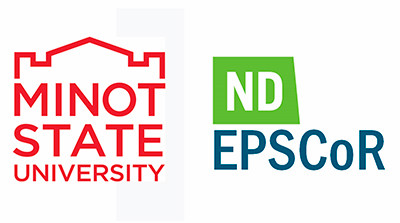MSU awarded grant to enhance STEM, research for rural students

MINOT, N.D. – The North Dakota Established Program to Stimulate Competitive Research (ND EPSCoR) is pleased to announce that its partnering institutions have been approved for a National Science Foundation (NSF) E-CORE award for their Sustainable Programs Advancing Research and Knowledge across North Dakota (SPARK-ND) proposal.
NSF has awarded the project for an anticipated total amount of $7,963,804 over four years. Minot State University will be a key player in the STEM Pathways Core, focusing on increasing STEM research literacy in rural populations with limited STEM opportunities. MSU will receive $480,000 in funding over the next four years to support these efforts.
SPARK-ND, funded by NSF under their EPSCoR Collaborations for Optimizing Research Ecosystems Research Infrastructure Improvement (E-CORE RII) program, aims to build a sustainable science, technology, engineering, and mathematics (STEM) research and education ecosystem in North Dakota. Led by North Dakota State University, 10 colleges and universities in North Dakota will collaborate to expand STEM research capacity in the state, connect research communities, build STEM research literacy in rural populations, and strengthen the STEM community at the five Tribal colleges and universities in North Dakota.
Key components of the STEM Pathways Core at Minot State include:
- Scientist in the classroom: This new program will bring Minot State STEM faculty into middle and high school classrooms to demonstrate engaging and interactive STEM projects and technologies. These activities will help students understand the importance of STEM and its relevance to their communities.
- Research shadow: Middle and high school students will have unique opportunities to observe authentic scientific research at MSU and research field sites, inspiring future STEM careers.
- Research experiences for high school students: High school students will engage in authentic research alongside Minot State faculty, fostering STEM interest and developing research skills during their projects – and paying them for their research time.
- Academic year research experiences: This program will expand undergraduate research opportunities at MSU, allowing students to engage in year-long research projects co-developed with STEM faculty.
The principal investigator for the project at Minot State is Joe Collette, professor of geosciences, with co-principal investigator Nigel George, professor of physics.
“Some folks in rural areas of North Dakota think being a scientist or being employed in a STEM-related field means you have to move away from your hometown,” said Collette. “That’s absolutely not the case — these STEM careers are everywhere. GPS-enabled combines are already part of agriculture in North Dakota. Drone-based applications are coming online at a staggering pace — not only can you do practical things like detect warm or cold spots on buildings and add more insulation, but we can also do things like census animal populations, estimate crop yields, and determine where the weeds in a particular field might need to be sprayed. Drones are even doing remote spraying of weeds.
“These science- and STEM-based career pathways will only become more in-demand in rural areas in the next few years.”
George expressed excitement about the grant and the opportunities it will provide North Dakota students.
“This funding will enable us to create meaningful STEM opportunities for rural students by exposing them to the vast potential of STEM careers right here in North Dakota!” added George.
The long-term impacts of the STEM Pathways Core project include increased participation rates of rural students in STEM, enhanced STEM engagement, and support for North Dakota’s STEM research and development efforts. By fostering connections between researchers, educators, and students, MSU aims to create a thriving STEM ecosystem that benefits the entire state.
For more information about the SPARK-ND initiative and the STEM Pathways Core projects, contact Collette at joseph.collette@minotstateu.edu or George at nigel.george@minotstateu.edu.
Minot State Land Acknowledgment: Minot State University gratefully acknowledges the Native Peoples on whose ancestral lands we sit. We praise the Anishinaabe and Assiniboine peoples, as well as the other sovereign nations of the northern plains whose lands encompass North Dakota today: The Turtle Mountain Band of Chippewa, the Mandan Hidatsa Arikara Nation, the Spirit Lake Nation, the Standing Rock Sioux Tribe, and the Sisseton Wahpeton Oyate.
Minot State University is proud that Native men and women have chosen to attend our university and enrich it with their knowledge and achievements.
In the spirit of collaboration, we reach out to our university and regional community with programs and activities that demonstrate our commitment to the First Peoples of the northern plains.
Colleges and universities participating in SPARK-ND are: Cankdeska Cikana Community College, Mayville State University, Minot State University, Nueta Hidatsa Sahnish College, North Dakota State University, Sitting Bull College, Turtle Mountain College, United Tribes Technical College, University of North Dakota, and Valley City State University.
About ND EPSCoR
ND EPSCoR provides leadership and coordination to broaden and diversify the STEM workforce pathway in North Dakota from K-12 through graduate school. By fostering collaborations among institutions of higher education, government agencies, and the private sector, ND EPSCoR aims to enhance the state's research competitiveness and drive economic development. For more information about ND EPSCoR, please visit https://ndepscor.ndus.edu/.
About Minot State University
Minot State University is a public university dedicated to excellence in education, scholarship, and community engagement achieved through
rigorous academic experiences, active learning environments, commitment to public service, and a vibrant campus life.
Published: 08/08/25




